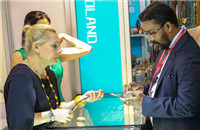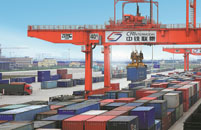New medical tool promotes stomach cancer detection
The detection of gastric diseases with effective and convenient tools will help patients receive the necessary treatment at an early stage.
The survival rate over five years for advanced stomach cancer is less than 30 percent, while the rate exceeds 90 percent if the disease is detected in the early stages.
Most cases are not found until the advanced stages, leading to high mortality, because the early symptoms of gastric cancer are seldom obvious, experts said.
According to experts, the absence of effective tools and mechanisms for early screening is the main reason for the difference in survival rates.
But, this could be about to change with the world's first magnetically controlled capsule endoscope system developed by Ankon Technologies Co Ltd.
The tool is suitable for regular stomach health checks and early stomach tumor screening.
This painless, noninvasive and infection-free experience provides a more effective screening tool for gastric diseases in the early stages, said Liao Zhuan, a gastroenterologist at Shanghai's Changhai Hospital.
Currently, gastric cancer is usually detected by gastroscopy, a process where a flexible tube called an endoscope is inserted into the patient's mouth and down into the stomach.
Many patients have poor tolerance for such a test and show little willingness to undergo the process.
Liao said that about 80 million people have refused gastroscopic examinations before because of the fear of the pain and discomfort the procedure causes.
Under such conditions, early detection of stomach cancer and the chances of survival become less likely.
Stomach cancer rates are declining globally, but it remains highly prevalent in Asian countries, especially in China, which has one of the highest rates of stomach cancer in the world.
Health data showed that about 400,000 new stomach cancer cases are discovered every year in China, accounting for more than 40 percent of all new gastric cancer cases worldwide.















